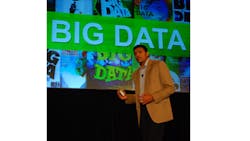This article was originally published on ControlGlobal.com.
Big Data starts with the right data. And the Internet of Things starts with the internet of your things. Such were the useful framing mechanisms shared by presenters at this year’s Rockwell Automation RSTechED conference in Orlando, Fla., to help the hundreds of automation and IT professionals in attendance begin to apply these powerful, but sometimes overwhelming concepts to the realities they'll face upon returning home.
To apply Big Data principles to one's own operations, first consider what assets are most critical to your operations, said Chirayu Shah, product manager, information software, Rockwell Automation. "Start with the end in mind and ask yourself questions like, 'What do you want to get out of your data?' and 'What could data tell you if you had it?'"
The true value of Big Data lies not in the data itself, but in what analytics applied to the right data reveal, Shah stressed. It's also important to realize that more isn't necessarily better. "Collecting no data is bad; collecting everything is good; but collecting what's relevant, the "just right" data, is great," he explained. And, once that data is collected, it needs to get to the right people so they can make the right decisions—so they can be more successful against their key performance indicators (KPIs). "You already likely have real-time data being presented to the operator, but are other parts of the organization getting the information they need?"
And while Big Data implies technology, it also represents a cultural shift: away from making decisions based on hunches, away from continuing to do things the way they've always been done toward making decisions based on data. But culture doesn't change overnight, and just because data is available doesn't mean it will be used. "Culture eats strategy for breakfast," Shah quipped. "So unless you have buy-in, you won't achieve the results you hoped."
Big Data, Meet IoT
According to Barb Edson, general manager, product management, for Microsoft's commercial Internet of Things (IoT) offering, there's similarly little broad-based consensus on what the IoT in her own title stands for, other than that it's "big, noisy and confusing," she said. Like Shah after her, Edson's first task on the RSTechED dais was to make the IoT more approachable to the many industrial automation and IT professionals in attendance.
"The Internet of Things starts with your things," Edson began. "It's about building on what you already have; it's about extending your networks to new devices where needed; and it's about getting more from the data you already have."
Underscoring the company's commitment to facilitating easier and more effective connectivity of pre-existing assets, Edson went on to the describe a powerful set of applications developed to provide managers of the venerable London Underground with improved visibility into the operations of their assets and movement of their people. Described more fully in two-minute YouTube video, the applications were developed and implemented in the course of 14 scant days, Edson said, by leveraging the power of Microsoft's new Azure Intelligent Systems Service (AISS), which securely connects, manages and captures machine-generated data from a variety of sensors and devices.
"Azure Intelligent Systems Service is designed to accelerate implementation and time-to-value for IoT applications," Edson said. She also announced that Rockwell Automation had joined Microsoft as an early adopter of AISS. "We want to help you optimize performance and reliability, produce data insights, achieve new levels of control and innovate on a flexible platform--all while feeling confident your data is protected."
